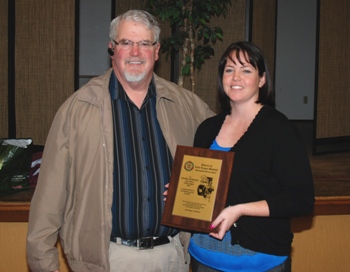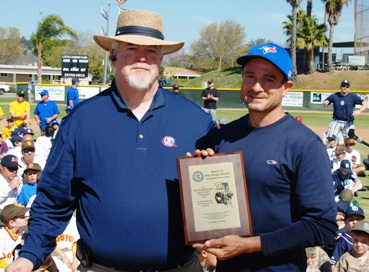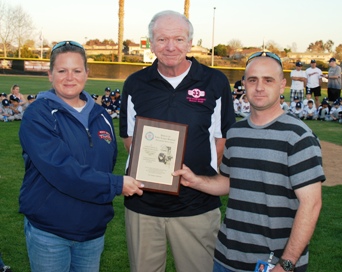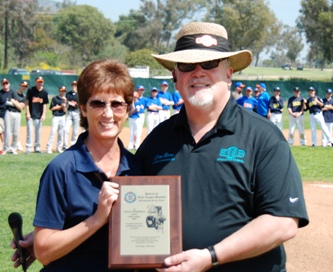News and Announcements
There are two requirements for clinic attendance: 1) Every team that participates in any District 33 Tournament will have their league’s team entry checked to make sure that the individual coaches meet the requirements stated above. 2) Each league will have to reach a minimum of 50% attendance for those divisions that do not send their teams to District 33 Tournaments (i.e. t-ball and lower minor coaches and managers). Steve Taylor, District Safety Officer, will be compiling a list of all the attendees from District approved clinics for the year to our master list. He will be doing this until the deadline on April 15th. Please check our Clinic Attendance for your name so you know where you stand. Make sure you are on the tab on the bottom of the list for the current year.
2013 Clinic Attendance List
We will be checking each team’s coaches against this list for the DDM, Clay Berry Invitational (CBI), 90’ Junior and season ending TOC. If you notice errors or omissions, please contact Clay Berry and Steve Taylor well before you get to the field. If you cannot prove that you fulfilled these requirements, you will be disqualified from participation with your team or your team will be disqualified after their first game of the District Tournament. The players should not be punished- if the manager or any coaches are not qualified by clinic attendance any or all staff may be replaced by a league’s coaches that do qualify.
District Requirements for hosting a League Approved Clinic
Clay Berry
District Administrator
Ca District 33
Patriot League Safety & Coaches Skills Clinics
 Sunday, March 24th, 2013
Sunday, March 24th, 2013Safety Clinic 12:00pm to 1:00pm
Coaches Skills Clinic 1:00pm to 4:00pm
Location: Patriot League
The Patriot League has invited all managers and coaches in District 33 to their Safety and Coaches Skills Clinics on Sunday, March 24, 2013 at the Patriot League's Shira Field located just across the lake from San Carlos Little League at 7001 Murray Park Drive, San Diego, CA 92119. Both of these clinics are free to anyone in District 33 and fulfill the requirements for District CBI, JR and TOC participation. Every coach or manager in our District must attend both a coaches and safety clinic once every three years. Each team in our District must have at least one coach or manager attend each year in order to be eligible to play in the District CBI, JR and TOC tournaments. Both of these clinics satisfy the District coaches and safety clinic requirement for these tournaments. This could be the last opportunity for this season for every coach and manager to complete the District requirements, please take advantage of it, your players are the one that will benefit from it.
The Safety Clinic - 12:00pm to 1:00pm: The purpose of this safety clinic is to raise awareness for every coach and manager on how to prevent and treat injuries. The topics that will be discussed are simple first aid, recovering and returning to action from an injury, prevention of injuries and Little League Safety Rules. Gene Lamke will present the Safety Management program and will utilize the PowerPoint presentation materials that have been developed by D33.
The Coaching Skills Clinic - 1:00pm to 4:00pm: This clinic is designed for Juniors level coaches and managers but coaches from all levels are invited to attend. Gene Lamke will coordinate the skills clinic with experts like Mike Pieratt, Varsity Pitching Coach at Patrick Henry High School, and others helping in selected skills areas.
The 2013 District Service Award recipients are...
|
|
|
|
|
|
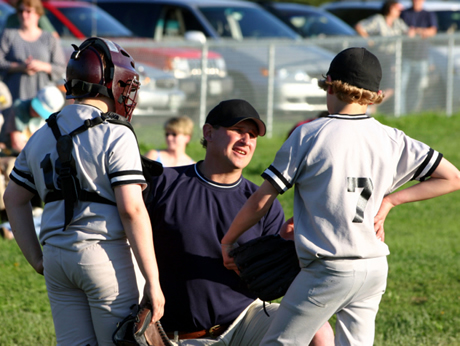 Bullying is a growing epidemic in sports. As sports parents, it's critical for you to be prepared to protect your young athletes. If you think this issue won't ever come up in your kids' sports careers, think again. Bully coaches are the number one topic parents write us about at Kids' Sports Psychology.
Bullying is a growing epidemic in sports. As sports parents, it's critical for you to be prepared to protect your young athletes. If you think this issue won't ever come up in your kids' sports careers, think again. Bully coaches are the number one topic parents write us about at Kids' Sports Psychology.
Have your kids ever had a coach who yelled at, insulted or intimidated them? It's possible they have, but were too embarrassed to tell you. It's important for you to be on the lookout for bully coaches and to take immediate action if you suspect your young athletes are being bullied.
Bully coaches target all kinds of young athletes. They can set their sights on kids who are overweight, small, or who lack confidence, for instance. These coaches also target gifted athletes because they believe their approach will "toughen up" their athletes.
It's important to keep in mind that most volunteer coaches are not trained. Many of them use teaching techniques that their coaches used with them. Some of them don't understand they're acting like bullies. Many coaches will change their behavior if you approach them in an appropriate manner. We've received letters of confession from coaches who say that once they understood how much their words and actions hurt their athletes, they changed their style. More: 6 Tips for Coaching Your Own Child
Whether a coach's bullying is intentional or unintentional, your job as sports parents is the same. If your athletes are teased, excluded or otherwise treated badly by coaches, you need to take steps to help keep their confidence intact, stay focused under adversity, and remain in sports.
The bottom line, for you as parents: Be on the lookout for bully coaches and arm yourself with the information you need to take action.
Stories From the Trenches
The many sports parents who have written us about bullying say their young athletes are teased, harassed, intimidated and threatened by bully coaches. Here's what some sports parents tell us:
"My daughter was bullied relentlessly on her high school gymnastics team by her coach. She was screamed at in front of her entire team after every meet, called names, criticized for everything, including how she talked, how she looked, what she wore. She was hanged in effigy." - Sports Parent
"Our teenage son's football experience has soured because of coaches who do not want their players to have any fun. One practice his coach told him to get in line for a drill and he told the coach his shoulder and arm hurt too much. The coach told him to quit whining over aches and get in line. When my son refused, from that day on their relationship has been bad. Eventually we took him to doctors and he missed the rest of the season." ~ Sports Parent. For more stories from parents visit the Youth Sports Psychology blog.
How Bully Coaches Affect Kid's Experience
Youth coaches are critical to kids' sports experiences. They can influence whether young athletes enjoy sports and want to continue to play. Some coaches get kids fired up about playing sports, while other coaches may discourage kids or take the fun out of sports. A good coach can keep kids' interest in sports alive.
Bullied kids think there is something wrong with them. This deflates them and creates a lack of comfort and security in sports. Often, young athletes' first reaction to being treated this way is shame. They don't want to talk about their experience. They feel as if they somehow caused the coaches to treat them badly.
What's more, bullying can hurt an athlete's confidence—in and out of sports. Sometimes kids say they can't get a bully's negative words out of their heads.
Kids who are bullied experience difficulty focusing on what they should focus on. They sometimes obsess about what a coach might say or do if they make mistakes or do something wrong. The kids are in fear. They focus on the wrong things during sports because they are preoccupied with gaining approval from the coach (or not disappointing the coach). Often they are afraid of how the coach will react if they make a bad move or decision.
Behaviors of Bully Coaches
Bully coaches often yell at, tease, humiliate and intimidate kids. Parents should never underestimate the importance of this type of behavior. It can really hurt kids' self-esteem.
As sports parents it's your job to ensure your athletes are in good hands. Bully coaches do NOT toughen up your young athletes, as they might insist. They don't improve kids' performance, either.
Coaches who bully—either with harsh words or physical harm—can hurt young athletes' self-esteem, undermine their social skills and make it hard for them to trust. In some cases, these coaches can make kids feel anxious and depressed. More: 3 Sports Psychology Tips for Parents and Coaches
What's more, coaches who use such negative feedback are generally focused too much on one thing: winning or turning out elite athletes. They give kids the message that winning is everything. That makes kids focus too much on outcomes—such as the score or win. It can prevent them from reaping the social and emotional benefits of taking part in sports.
Focusing too much on the score or winning also can hurt kids' performance. They often develop fear of failure. That means they stop taking risks and they play too tentatively. That's because they're afraid the coach will yell at them or punish them.
Take Action
Before you even sign your kids up for a team, it's entirely appropriate and reasonable to interview the coach. You should ask potential coaches about their philosophy and how they handle playing time. More: Why Coaches Should Have a Parents Meeting
If your young athletes are already part of a team, but don't seem happy with the coach, you need to do some research. Gently ask your kids questions about how the coaches treat the team and watch carefully for how they react.
You might ask other parents what they've seen or heard. Attend games and practices and keep a lookout for signs of yelling, intimidation or physical bullying. Some coaches, for example, will throw balls at kids in an effort to scare them. This shouldn't be tolerated
If you see or hear about a coach who yells at, intimidates or insults kids, you should take action. If you merely sit back and complain, you're part of the problem. Instead, you need to begin by talking to the coach. You can gently suggest that his or her behavior may hurt kids' confidence or self-esteem.
In some cases, you may find that you can't change the coach's behavior. If this happens, you should try talking to a league or school administrator who oversees the coach. If that isn't helpful, consider moving your child to a different coach or team. Staying with the same coach will likely increase your kids' anxiety and hurt their athletic performance and confidence—at a minimum. More: How to Keep a Strong Parent-Coach Relationship
Award-winning parenting writer Lisa Cohn and Youth Sports Psychology expert Dr. Patrick Cohn are co-founders of The Ultimate Sports Parent. Pick up their free e-book, "Ten Tips to Improve Confidence and Success in Young Athletes" by visiting youthsportspsychology.com.
